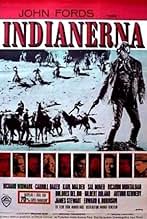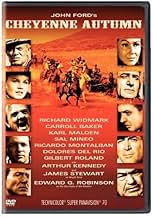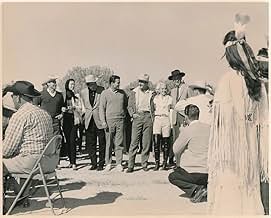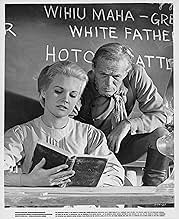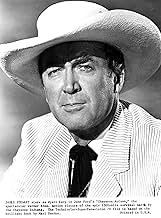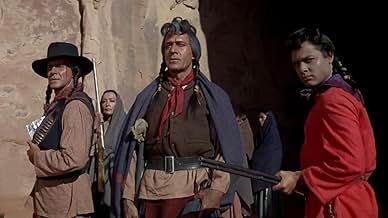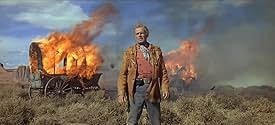IMDb RATING
6.7/10
6.8K
YOUR RATING
The Cheyenne, tired of broken U.S. government promises, head for their ancestral lands but a sympathetic cavalry officer is tasked to bring them back to their reservation.The Cheyenne, tired of broken U.S. government promises, head for their ancestral lands but a sympathetic cavalry officer is tasked to bring them back to their reservation.The Cheyenne, tired of broken U.S. government promises, head for their ancestral lands but a sympathetic cavalry officer is tasked to bring them back to their reservation.
- Director
- Writers
- Stars
- Nominated for 1 Oscar
- 1 win & 3 nominations total
Dolores Del Río
- Spanish Woman
- (as Dolores Del Rio)
Elizabeth Allen
- Guinevere Plantagenet
- (as Betty Ellen)
- Director
- Writers
- All cast & crew
- Production, box office & more at IMDbPro
Featured reviews
I rediscovered "Cheyenne Autumn" recently and must confess to finding the temptation to hail it as almost the greatest of the John Ford Westerns irresistable. I say "almost" as I realise that the claim needs a certain amount of caution. When set beside the formal perfection of "The Searchers", "My Darling Clementine" and even "She Wore a Yellow Ribbon", "Cheyenne Autumn" has a few weak moments and certainly some longeurs. And yet it has a monumental sweep that somehow outstrips them all. Ford's final Western is an apologia for the white Americans' treatment of the American Indian and his own depiction of them as the bad guys in so much of his previous work. Here the Cheyenne are the victims of White oppression, forced to live far to the south of their natural homeland and desperate to return. Depleted in number mainly through illness and starvation they set out on the long trek north, beset on all sides by alien landscape conditions and the American cavalry in pursuit. These pathetic remnants of a once noble tribe now consist of little more than a group of women and children - very few of the male warriors are left - accompanied by a white Quaker woman who has befriended them. One American cavalry officer (Richard Widmark in one of his best performances) recognises their dilemma and does all he can to summon official awareness of their plight. In a sense this is one of the finest of all road movies, the protagonists forced to face the long journey home across a seemingly endless wilderness. Only through an inner determination are the remnants of the tribe able to make it. It is also one of cinema's most powerful documentations of man's inhumanity to man, not light years away from "Come and See" and Ford's own "The Prisoner of Shark Island". The film is badly flawed by the intrusion of a semi-comic interlude depicting Wyatt Earp and Doc Holliday more intent on card play in Dodge City than in what is happening around them. This only serves to slow the pace of a film that is often prone to encompass peripheral detail to the detriment of moving purposefully forward. But who can quibble when the end result encompasses one magnificent image after another in William Clothier's splendid 'scope photography and the only music score - by Alex North - that ever did real justice to a Ford picture. For once we actually get away from those endless medleys of sentimental hymn and folk melodies with an astringency of style that matches the serious content of the film.
Historical and overlong movie recounting the legendary Cheyenne trek led by the Indian chiefs , Little Wolf and Dull Knife . The picture is an epic portrait of the historic story about celebrated Cheyenne (they are actually Navajo , telling dirty jokes in their native tongue) and their legendary feat leading the tribe on a journey to freedom , uprooting them from the Yellowstone and resettling them in distant Oklahoma . This majestic flick illustrates the callous disregard with which the government treated the Cheyenne in the 1880s as the US agency fails to deliver even the meager provisions due by peace treaty to the stubborn tribe in their stark desert reserve without proper supplies for survival ; then the starving Indians have taken more abuse than it's worth and break it too by embarking on a 1,500 miles trek back to their ancestral hunting grounds , being led by Little Wolf and Dull Knife (Ford was urged by producers to cast first stars as Richard Boone and Anthony Quinn , as both had Native American blood ; however , Ricardo Montalban and Gilbert Roland, who were of Mexican descent , were cast instead) . Meanwhile , proud Cheyenne tribe square off US cavalry commanded by Thomas Archer (Richard Widmark) who leads his army on a wild chase across the barren plains in this saga of the old west . Red Shirt (played by Sal Mineo , though John Ford would not allow him to speak any English dialog in the picture due to the actor's Bronx accent) , a rebel Indian does the first shot against cavalry . Captain Thomas Archer goes to deal with Secretary of Interior Schulz about the unfortunate Indians (Spencer Tracy was first cast , but had a stroke and was replaced by Edward G. Robinson, , including the background had to be done with screen process and whose scenes were entirely photographed in studios) , taking place a climatic meeting scene between Shultz and the Cheyenne chiefs . The tribe refuses to surrender in this chronicle of a bitter fight between the tribe and the US cavalry in the struggle for the west . Now the mightiest true adventure of all! Filmed by 6-time Academy Award winner John Ford...with a massive all-star cast! .1,500 miles of heroism and incredible adventure!
This sprawling epic film displays Western action , shootouts , drama and spectacular battles . It's a thoughtful piece for its time that had an original tragic ending and imbued with moments of sensitive poetry . This nice Western contains interesting characters , full of wide open space and dramatic moments . This classic , sturdy picture ranks as one of the most sentimental of John Ford's work . Thought-provoking , enjoyable screenplay portraying in depth characters and brooding events with interesting issues running beneath script surface and suggested by Mari Sandoz in "Cheyenne Autumn¨ with screenplay by James R. Webb and based on a novel titled Last Frontier by Howard Fast who also wrote Spartacus . This excellent film featuring a magnificent performance by the whole main cast , including a top-notch supporting cast . Awesome Richard Widmark in a larger-than-life character along with a gorgeous Carrol Baker and a magnificent Karl Malden as deranged captain Wessels . In the film appears , as usual , Ford's favourite actors such as : Ben Johnson , Harry Carey Jr. , Mike Mazurki , George O'Brien , Mae Marsh , Patrick Wayne , Dolores Del Rio , Ken Curtis , Elizabeh Allen , Willis Bouchey , and , of course , James Stewart as obstinate sheriff Earp . Ford added the segment with Stewart in place of an intermission , in spite of the film was overlong , and so he came up with the Wyatt Earp segment , giving Stewart an awesome interpretation , as usual . Outdoors are pretty gorgeous and well photographed in Super Panavision 70mm by William H. Clothier , Ford's regular , and filmed on location in Moab, Utah ,Fort Laramie, Wyoming, Monument Valley, Utah , Gunnison Canyon , Colorado . Rousing and an impressive musical score by Alex North who composed other masterpieces as Spartacus and Cleopatra.
This may not be Ford's best Western , as many would claim , but it's still head ad shoulders above most big-scale movies . You'll find the ending over-dramatic according to your tastes , though it's lovingly composed by John Ford who really picks up battle , drama and sensibility towards the ending . Rating : Better than average , worthwhile watching . The motion picture well produced by Bernard Smith was brilliantly directed by John Ford at his last film . This powerful movie will appeal to Indian Western fans .
This sprawling epic film displays Western action , shootouts , drama and spectacular battles . It's a thoughtful piece for its time that had an original tragic ending and imbued with moments of sensitive poetry . This nice Western contains interesting characters , full of wide open space and dramatic moments . This classic , sturdy picture ranks as one of the most sentimental of John Ford's work . Thought-provoking , enjoyable screenplay portraying in depth characters and brooding events with interesting issues running beneath script surface and suggested by Mari Sandoz in "Cheyenne Autumn¨ with screenplay by James R. Webb and based on a novel titled Last Frontier by Howard Fast who also wrote Spartacus . This excellent film featuring a magnificent performance by the whole main cast , including a top-notch supporting cast . Awesome Richard Widmark in a larger-than-life character along with a gorgeous Carrol Baker and a magnificent Karl Malden as deranged captain Wessels . In the film appears , as usual , Ford's favourite actors such as : Ben Johnson , Harry Carey Jr. , Mike Mazurki , George O'Brien , Mae Marsh , Patrick Wayne , Dolores Del Rio , Ken Curtis , Elizabeh Allen , Willis Bouchey , and , of course , James Stewart as obstinate sheriff Earp . Ford added the segment with Stewart in place of an intermission , in spite of the film was overlong , and so he came up with the Wyatt Earp segment , giving Stewart an awesome interpretation , as usual . Outdoors are pretty gorgeous and well photographed in Super Panavision 70mm by William H. Clothier , Ford's regular , and filmed on location in Moab, Utah ,Fort Laramie, Wyoming, Monument Valley, Utah , Gunnison Canyon , Colorado . Rousing and an impressive musical score by Alex North who composed other masterpieces as Spartacus and Cleopatra.
This may not be Ford's best Western , as many would claim , but it's still head ad shoulders above most big-scale movies . You'll find the ending over-dramatic according to your tastes , though it's lovingly composed by John Ford who really picks up battle , drama and sensibility towards the ending . Rating : Better than average , worthwhile watching . The motion picture well produced by Bernard Smith was brilliantly directed by John Ford at his last film . This powerful movie will appeal to Indian Western fans .
I have recently seen again "Cheyenne Autumn", and, perhaps, I finally got it. In my opinion, this film represents the desperation of an artist, the director John Ford. Forget the usual stunning beauty of the cinematography, the accuracy in filming action scenes, the care for poetic details, and all Ford's trade-mark style. We readily see that "Cheyenne Autumn" is completely different from any other western movie, and not only from the remainder of Ford's work.
Compared with other western movies, the main difference and innovation is that here any killed man is a REAL tragedy, that exhaustion, famine, cold, violence are REAL sufferings for the miserable people on the screen (not just for the Cheyennes, even for the whites). And all that is shown us by Ford ruthlessly, uncompromisingly. The fact that the director stands for the Indians is not as much innovative as it seems. All along his career Ford showed respect and sympathy for them. In the finale, just after an apparent happy ending, we have again violence, again a murder, again a distressed mother: we almost feel the same grief of hers. It is somewhat ironic that in the same year the film was made, 1964, the fashion of Italian western movies invaded the world of cinema, with furious, acrobatic gun-fights and hundreds of shot-dead people, like in a sort of funny game.
The movie is split into two parts by a comic interlude, the episode placed in Dodge City, which is actually a farce. I think that Ford wanted to pay a homage and bid his personal farewell to the old silent western-movies of the 1920s, when his career started. The funny situations are deliberately over the top: see the sensational, licentious joke, when Wyatt Earp (Jimmy Stewart) realizes that he actually had met the girl in Wichita... In any case, a somewhat gloomy mood permeates even this comic part. The main characters are all aged, grey-haired and seemingly life-weary. And the episode is introduced by a particularly brutal, cruel murder.
I think that "Cheyenne Autumn" is a beautiful film, with a good story, great visual beauties, and, in particular, an excellent acting by the whole cast. But it is tough for me to face John Ford's desperate vision. After all, what I most like in the movie is to see, once again, Ben Johnson and Harry Carey Jr on horse-back, in their blue uniforms (by the way: why are they uncredited?). They are both aged and bulkier compared with their look in the great Ford's western-epics of their youth. Never mind: they are almost dearer to me for this very reason...
Compared with other western movies, the main difference and innovation is that here any killed man is a REAL tragedy, that exhaustion, famine, cold, violence are REAL sufferings for the miserable people on the screen (not just for the Cheyennes, even for the whites). And all that is shown us by Ford ruthlessly, uncompromisingly. The fact that the director stands for the Indians is not as much innovative as it seems. All along his career Ford showed respect and sympathy for them. In the finale, just after an apparent happy ending, we have again violence, again a murder, again a distressed mother: we almost feel the same grief of hers. It is somewhat ironic that in the same year the film was made, 1964, the fashion of Italian western movies invaded the world of cinema, with furious, acrobatic gun-fights and hundreds of shot-dead people, like in a sort of funny game.
The movie is split into two parts by a comic interlude, the episode placed in Dodge City, which is actually a farce. I think that Ford wanted to pay a homage and bid his personal farewell to the old silent western-movies of the 1920s, when his career started. The funny situations are deliberately over the top: see the sensational, licentious joke, when Wyatt Earp (Jimmy Stewart) realizes that he actually had met the girl in Wichita... In any case, a somewhat gloomy mood permeates even this comic part. The main characters are all aged, grey-haired and seemingly life-weary. And the episode is introduced by a particularly brutal, cruel murder.
I think that "Cheyenne Autumn" is a beautiful film, with a good story, great visual beauties, and, in particular, an excellent acting by the whole cast. But it is tough for me to face John Ford's desperate vision. After all, what I most like in the movie is to see, once again, Ben Johnson and Harry Carey Jr on horse-back, in their blue uniforms (by the way: why are they uncredited?). They are both aged and bulkier compared with their look in the great Ford's western-epics of their youth. Never mind: they are almost dearer to me for this very reason...
This film shows just a bit of the tragedy of Northern Cheyenne. The film or John Ford did not show that they initially fought together with Sioux led by Sitting Bull war in 1876 and were partially massacred by Custer. Later they fought once again and were defeated at McKenzie compelling them to surrender. Two years later, the prisoners Dull Knife, Wild Hog, and Little Wolf were brought down as prisoners to Fort Reno, from where they escaped and were later killed without mercy. Part of the survivors were killed later when they tried to escape from Fort Robinson, Nebraska, and the others finally confined to a reservation in Montana. Probably Ford wanted to show this story softly giving some feeling of justice to Captain Archer (Richard Widmark), but at the end the film became an approximate story of the reality. Cheyenne, either northern or southern were expelled out from their natural areas, they missed bull hunting and their ancestral traditions. Beside this historical considerations, one must admit that Ford had a very good cast for the film with Widmark, Carroll Baker, always efficient Edward G. Robinson, Karl Malden and others. The only thing difficult to understand was the scene with James Stewart (as Wyatt Earp) together with the veterans Arthur Kennedy and John Carradine, which in my opinion was out of the context.
Some people believe that Westerns are not more of use in Hollywood. I believe that some westerns giving real stories of what happened with the Indians are very much necessary to understand the history of the real American people. Geronimo, Sitting Bull, Dull Knife and others were not criminals, they were only defending the land where they were born and raised. So their lives should be brought fairly to the screen in the coming future.
Some people believe that Westerns are not more of use in Hollywood. I believe that some westerns giving real stories of what happened with the Indians are very much necessary to understand the history of the real American people. Geronimo, Sitting Bull, Dull Knife and others were not criminals, they were only defending the land where they were born and raised. So their lives should be brought fairly to the screen in the coming future.
This was John Ford's last Western and it is generally viewed as a weak film. It has been described as his "apology" to Indians for his allegedly negative portrayal of them in his earlier films. If you read the statement he made to Peter Bogdonavich, he doesn't actually use the word "apology". He says he just wanted to a make movie told more from the Indian point of view.
This makes more sense, because most Ford Westerns, with perhaps the exception of "Stagecoach" and "Rio Grande" dealt relatively fairly with Indian characters. I don't think he had much to apologize for.
This movie is underrated by critics. I'm not sure why. I thought it compared favorably with his better work.
Here are the positives about the movie:
Now here are some things that kept the movie from being better:
On the one hand, it seems very odd to introduce a German officer who's oppressing the Cheyenne because "he's only following orders." Do we have to implicate the Germans in our genocide? Don't they have enough problems of their own on this issue?
On the other hand, I guess the point was to draw a comparison between the Holocaust and the destruction of the American Indian population. This was probably a very aggressive and controversial idea in 1964, for Americans anyway. The Germans I've known over the years never had a problem mentioning it to me. In fact, often they would talk of little else.
This makes more sense, because most Ford Westerns, with perhaps the exception of "Stagecoach" and "Rio Grande" dealt relatively fairly with Indian characters. I don't think he had much to apologize for.
This movie is underrated by critics. I'm not sure why. I thought it compared favorably with his better work.
Here are the positives about the movie:
- It may be Ford's most beautiful film. He lingers in Monument Valley far longer than the logic of the script would dictate. He knew this would be that last time he would shoot there. The results are spectacular.
- The film has a stately, almost regal pace with an excellent accompanying soundtrack. This matches the pace of the central plot element – a six month journey by foot.
- It manages to never be dull. This is quite an accomplishment since there is no real hero, no real heavy and very little violent conflict. It's an example of very fine low key storytelling.
- Although this is a strong Indian point of view movie, it never becomes condescending or maudlin. Both sides are presented with respect and complexity.
- I've read much criticism of the Dodge City comic relief interlude. I thought this was fantastic segment. What a pleasure to see old pros like John Carradine, James Stewart and Arthur Kennedy do cameos in Ford's last Western. Ford understood the importance of inserting comic relief into Westerns, which are normally tense dramas in need of counterpoint. This is even more effective in the fundamentally somber "Cheyenne Autumn".
- Almost all strong Indian point of view movies are relentless downers that include no comic relief. For example, "Devil's Doorway", "Broken Arrow", "Dances With Wolves". Ford doesn't compromise on his traditional heavy use of humor in this movie and he also includes a somewhat optimistic ending. The ending may seem unrealistically positive, but it is actually at least partly rooted in historical accuracy, from what I've read. Of course, in the big historical picture there was no happy ending for the Indians. The question is: who wants to watch a movie that is that depressing? Ford strikes a good compromise here.
- Carol Baker is an underrated actress. She has a great screen presence and is very good in this film. Her character was very credible, if maybe a little too good looking. If she's a typical 1880's Quaker chick, I would have had to rethink my religious affiliation.
Now here are some things that kept the movie from being better:
- Widmark looks great, but I wish his character had been a more active player in plot developments. It's not best for the male lead to be too much of an observer. Also, he is way too old to be Carol Baker's romantic interest.
- The Indians are poorly cast with the use of mediocre Hispanic actors. I can't believe those weird bangs are authentic hairdos either. If they are, I would have invoked artistic license to change them.
- The subplot with the split between the Cheyenne leaders and the final confrontation at the end was poorly drawn, poorly acted and pointless.
- There are a few plot holes. The only one that really bothered me was the Cheyenne somehow managing to smuggle 20 rifles into their holding facility in the fort in Nebraska.
- Finally, this isn't really a fault, but I wanted to mention that I'm torn about Karl Malden's character.
On the one hand, it seems very odd to introduce a German officer who's oppressing the Cheyenne because "he's only following orders." Do we have to implicate the Germans in our genocide? Don't they have enough problems of their own on this issue?
On the other hand, I guess the point was to draw a comparison between the Holocaust and the destruction of the American Indian population. This was probably a very aggressive and controversial idea in 1964, for Americans anyway. The Germans I've known over the years never had a problem mentioning it to me. In fact, often they would talk of little else.
Did you know
- TriviaYears earlier Richard Widmark had the historical subject matter researched at Yale. He brought the material to John Ford, who didn't want to make it. Years later Ford, who had kept the research, changed his mind and asked Widmark to star.
- GoofsThe Navajos travel 1500 miles but never seem to leave Monument Valley, except for some snow scenes.
- Quotes
Secretary of the Interior: Oh, Henry... you and I fought together at Gettysburg. You had never seen a Negro slave. All you ever knew was that they were human beings with the rights of human beings - and it was worth an arm to you.
- Alternate versionsMany television prints run 145 minutes, and omit the scene with James Stewart as Wyatt Earp. The video release is the full 154-minute version.
- ConnectionsEdited into Film socialisme (2010)
- How long is Cheyenne Autumn?Powered by Alexa
Details
- Release date
- Country of origin
- Language
- Also known as
- El ocaso de los cheyenes
- Filming locations
- Production company
- See more company credits at IMDbPro
Box office
- Budget
- $4,200,000 (estimated)
- Gross worldwide
- $10,980
- Runtime
- 2h 34m(154 min)
- Aspect ratio
- 2.20 : 1
Contribute to this page
Suggest an edit or add missing content



